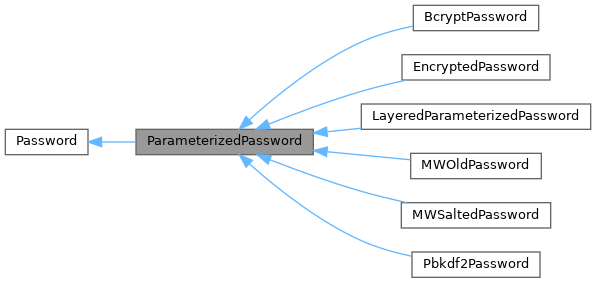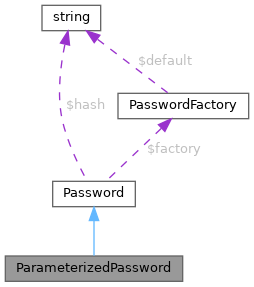Helper class for password hash types that have a delimited set of parameters inside of the hash. More...


Public Member Functions | |
| needsUpdate () | |
| Determine if the hash needs to be updated. | |
| toString () | |
| Convert this hash to a string that can be stored in the database. | |
 Public Member Functions inherited from Password Public Member Functions inherited from Password | |
| __construct (PasswordFactory $factory, array $config, $hash=null) | |
| Construct the Password object using a string hash. | |
| crypt ( $password) | |
| Hash a password and store the result in this object. | |
| equals ( $other) | |
| Compare one Password object to this object. | |
| getType () | |
| Get the type name of the password. | |
Protected Member Functions | |
| getDefaultParams () | |
| Return an ordered array of default parameters for this password hash. | |
| getDelimiter () | |
| Returns the delimiter for the parameters inside the hash. | |
| parseHash ( $hash) | |
| Perform any parsing necessary on the hash to see if the hash is valid and/or to perform logic for seeing if the hash needs updating. | |
 Protected Member Functions inherited from Password Protected Member Functions inherited from Password | |
| assertIsSafeSize ( $hash) | |
| Assert that hash will fit in a tinyblob field. | |
Protected Attributes | |
| array | $args = [] |
| Extra arguments that were found in the hash. | |
| array | $params = [] |
| Named parameters that have default values for this password type. | |
 Protected Attributes inherited from Password Protected Attributes inherited from Password | |
| array | $config |
| Array of configuration variables injected from the constructor. | |
| PasswordFactory | $factory |
| Factory that created the object. | |
| string | $hash |
| String representation of the hash without the type. | |
Additional Inherited Members | |
 Public Attributes inherited from Password Public Attributes inherited from Password | |
| const | MAX_HASH_SIZE = 255 |
| Hash must fit in user_password, which is a tinyblob. | |
Detailed Description
Helper class for password hash types that have a delimited set of parameters inside of the hash.
All passwords are in the form of :<TYPE>:... as explained in the main Password class. This class is for hashes in the form of :<TYPE>:<PARAM1>:<PARAM2>:... where <PARAM1>, <PARAM2>, etc. are parameters that determine how the password was hashed. Of course, the internal delimiter (which is : by convention and default), can be changed by overriding the ParameterizedPassword::getDelimiter() function.
This class requires overriding an additional function: ParameterizedPassword::getDefaultParams(). See the function description for more details on the implementation.
- Since
- 1.24
Definition at line 38 of file ParameterizedPassword.php.
Member Function Documentation
◆ getDefaultParams()
|
abstractprotected |
Return an ordered array of default parameters for this password hash.
The keys should be the parameter names and the values should be the default values. Additionally, the order of the array should be the order in which they appear in the hash.
When parsing a password hash, the constructor will split the hash based on the delimiter, and consume as many parts as it can, matching each to a parameter in this list. Once all the parameters have been filled, all remaining parts will be considered extra arguments, except, of course, for the very last part, which is the hash itself.
- Returns
- array
Reimplemented in BcryptPassword, EncryptedPassword, LayeredParameterizedPassword, MWOldPassword, MWSaltedPassword, and Pbkdf2Password.
Referenced by needsUpdate(), and parseHash().
◆ getDelimiter()
|
abstractprotected |
Returns the delimiter for the parameters inside the hash.
- Returns
- string
Reimplemented in BcryptPassword, EncryptedPassword, LayeredParameterizedPassword, MWOldPassword, MWSaltedPassword, and Pbkdf2Password.
Referenced by parseHash(), LayeredParameterizedPassword\partialCrypt(), and toString().
◆ needsUpdate()
| ParameterizedPassword::needsUpdate | ( | ) |
Determine if the hash needs to be updated.
- Returns
- bool True if needs update, false otherwise
Reimplemented from Password.
Definition at line 81 of file ParameterizedPassword.php.
References getDefaultParams().
◆ parseHash()
|
protected |
Perform any parsing necessary on the hash to see if the hash is valid and/or to perform logic for seeing if the hash needs updating.
- Parameters
-
string $hash The hash, with the :<TYPE>: prefix stripped
- Exceptions
-
PasswordError If there is an error in parsing the hash
Reimplemented from Password.
Reimplemented in BcryptPassword.
Definition at line 52 of file ParameterizedPassword.php.
References Password\$hash, getDefaultParams(), and getDelimiter().
◆ toString()
| ParameterizedPassword::toString | ( | ) |
Convert this hash to a string that can be stored in the database.
The resulting string should be considered the seralized representation of this hash, i.e., if the return value were recycled back into PasswordFactory::newFromCiphertext, the returned object would be equivalent to this; also, if two objects return the same value from this function, they are considered equivalent.
- Returns
- string
- Exceptions
-
PasswordError if password cannot be serialized to fit a tinyblob.
Reimplemented from Password.
Definition at line 85 of file ParameterizedPassword.php.
References Password\$hash, $res, Password\assertIsSafeSize(), and getDelimiter().
Member Data Documentation
◆ $args
|
protected |
Extra arguments that were found in the hash.
This may or may not make the hash invalid.
Definition at line 50 of file ParameterizedPassword.php.
Referenced by LayeredParameterizedPassword\crypt(), and LayeredParameterizedPassword\partialCrypt().
◆ $params
|
protected |
Named parameters that have default values for this password type.
Definition at line 43 of file ParameterizedPassword.php.
Referenced by LayeredParameterizedPassword\crypt(), LayeredParameterizedPassword\getDefaultParams(), and LayeredParameterizedPassword\partialCrypt().
The documentation for this class was generated from the following file:
- includes/password/ParameterizedPassword.php